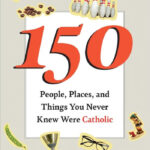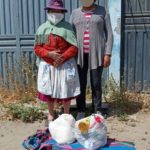
Mary of Magdala is amazed when she discovers the empty tomb of Christ in the Gospel of Mark that we will hear proclaimed during the Easter Vigil Saturday night. Amazement, in this sense, describes a sense of bewilderment, fear of something so unexpected.
Amazement might be a good word to describe the bewilderment and fear we experienced in the early weeks of the COVID-19 pandemic that altered our lives beginning with Lent last year. Sweeping cancellations of cherished events, activities and traditions amazed us, but none more so than watching Easter Triduum Mass — celebrated in empty churches — from our homes instead of in person. The passion, death and resurrection of Christ took on a poignancy we never imagined. As a faith community, we sacrificed in-person attendance at Mass for several months, for the protection of others and ourselves.
This year, our churches are open for celebration of the Easter Triduum (Holy Thursday through Easter Sunday), with pandemic protocols in place. In his Palm Sunday homily, Pope Francis “urged Christians to gaze upon Jesus on the cross and let themselves ‘be amazed … so we can start living again, for the grandeur of life lies not in possessions and promotions, but in realizing we are loved, and in experiencing the beauty of loving others’” (CRUX, 3-28-21).
One of Pope Francis’ predecessors, St. John Paul II, used the word “amazement” to describe where our celebration of the Eucharist should lead us. In his encyclical letter, “Ecclesia de Eucharistia” (2003) he says, “In this gift Jesus Christ entrusted to his Church the perennial making present of the paschal mystery. With it he brought about a mysterious ‘oneness in time’ between that Triduum and the passage of the centuries. The thought of this leads to profound amazement and gratitude” (No. 5).
Our amazement and gratitude should inspire us to “think of the urgent need to work for peace, to base relationships between peoples on solid premises of justice and solidarity, and to defend human life from conception to its natural end,” St. John Paul II says. “And what should we say of the thousand inconsistencies of a ‘globalized’ world where the weakest, the most powerless and the poorest appear to have so little hope! It is in this world that Christian hope must shine forth (No. 20).”
What keeps us from acting upon this amazement and gratitude as we enter the Easter Triduum?
Many things: a lack of faith, self-reliance, false idols, sin and our stubborn refusal to look beyond our political differences. Self-righteousness overshadows hope and dims our amazement and gratitude.
We must continue to work toward instilling life-affirming values in our country — advocating for the unborn child to the elderly person facing the end of life, making no exceptions between the lovable and the not so lovable, including criminals. Advocacy begins with keeping informed about legislative issues through nonpartisan sources such as the Iowa Catholic Conference (iowacatholicconference.org) and the U.S. Conference of Catholic Bishops (www.usccb.org). Their websites offer opportunities to sign up for action alerts to advocate for issues with our state and elected legislators.
We must commit to prayer, reflection and then discussion with each other — in small faith groups or one on one — about what it means to work for the common good. “The common good is the good we all share in, the good of the people as a whole, as well as the goods we hold in common that should be for all,” Pope Francis says in his new book, “Let Us Dream, The Path to a Better Future.”
We need to acknowledge our interconnectedness, even in the midst of our differences. The pandemic showed us just how connected we are, dependent on one another for our daily sustenance. Who knew how much we depended on the U.S. Postal Service? The delivery person? Meatpacking plant workers, seasonal farmworkers? Healthcare workers? Suppliers of hand sanitizer, toilet paper and canned food? “What unites us is our shared insufficiency, our mutual dependence on God and each other,” Pope Francis says in “Let Us Dream.”
This Easter Triduum, we give witness to the amazing reality of our faith: Jesus Christ suffered, died and rose from the dead because of his love for each of us — sinners who have received the promise of eternal life. God transformed Mary of Magdala’s amazement so that she could share that good news with the other disciples.
We follow Mary of Magdala’s example by sharing the good news in our actions toward others — the unborn, the immigrant, the poor, the ostracized, the prisoner, and one another — no exceptions.
Barb Arland-Fye, Editor
arland-fye@davenportdiocese.org











